Archiv
Kategorien
Ärgernisse
Biblionetz
Elektromobil
Gadgets
Geek
Ideen
Informatik
IA
iPhone
Medienbericht
MedienBildung
OLPC
PH Solothurn
PHSZ
Schule & ICT
Scratch
Software
Tablet-PC
Veranstaltungen
Visualisierungen
Video
Wiki
Wissenschaft
Mehr als 0 und 1
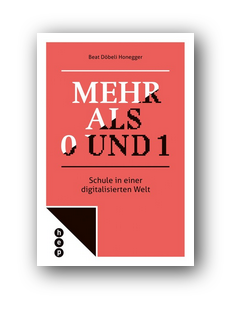
Letzte Postings
- Weitere Logfile-Merkwürdigkeiten09 Apr 2025 - 08:59 6
- Kann eine KI 'die härtesten Bezahlschranken überwinden'?29 Sep 2024 - 16:27 1
- Boah, aus X lässt sich jetzt Y generieren!22 Sep 2024 - 07:59 4
- Evaluationsstruktur 'Lernen mit GMLS'17 Sep 2024 - 13:52 1
- Pixel-Inflation15 Sep 2024 - 11:39 2
- Kurze URLS für Portraitseiten von Mitarbeitenden an Hochschulen07 Sep 2024 - 08:24 1
- Sommerlektüre 202414 Aug 2024 - 17:05 1
- Spass mit Graphen19 Jul 2024 - 12:13 2
- Warum GMLS und nicht einfach LLM?18 Jul 2024 - 12:19 2
- Die Informationsflut-Pegelstandanzeige04 Jan 2024 - 12:36 1
 für gesamten Blog
für gesamten Blog
You are here: Beats Weblog
Gast-Beitrag von Learnify-CEO Per Brahm
05 June 2015 - Version 1 Vor etwa zwei Wochen habe ich meinen ersten Eindruck von Learnify gebloggt. Per Brahm, der CEO von Learnify Schweden hat darauf und auf zusätzliche, direkt an learnify.ch gestellte Fragen reagiert und wollte mein Posting kommentieren (was aber leider aufgrund technischer Probleme nicht funktioniert hat, sorry...). Der Kommentar wäre auch etwas lang geworden, so dass ich ihn gerne als Gastbeitrag hier abdrucke:0. Hi
Hi, and thank you very much for the very thorough review you have made on the Swiss Learnify Beta! Im Per Brahm the founder of Learnify Sweden and I truly appreciate your comments in the blog. It helps us put the focus in our development and also in what to communicate better. Before I declare my views Id like to mention that this is a Swiss venture and the decisions are made by the Verein Digitale Bildung Schweiz, Im just trying to support with resources and experience from what we have done in Sweden. The only corrections Id like to mention is that there is possibility to co-edit material at the same time for different users (like in Google Drive) and there is an automatic version control built into Learnify that saves your last 10 version and one version/day by clicking the arrow back in the interface. Your other comments definitely point out places for improvement in the system. The user interface is under development to make it responsive and more modern. That is something we have been working with a while. Its a bit complicated since we integrate many sources and the user is also allowed to produce content but we are well on our way. The community functionality for instance to be able to follow what my favorites publish is also coming in the next releases.1. Content is King
So true. In Sweden we have gathered hundreds of thousands of learning resources (if not millions depending on definitions). Volume, quality, filtering and search are always relevant questions. We have a lot of discussions with content providers in Switzerland that seems very positive. One of the main reasons for launching the beta is to illustrate what we are doing to be able to have more concrete discussions. We have also discussions with LearningApps and other tools that we might be able to integrate. I think the greatest success factor in Sweden has been that we are willing to cooperate with so many and that a teacher using Learnify can pick content from different sources, combine them as they like, add their own material, publish it to all to the Students with single-sign-on for all the content in any LMS, and also be able to share and cooperate with other teachers regardless of LMS.Is all content released for everyone?
There are different models for different types of content. We now focus on open material that is available for everyone.Most Publishers will need to get paid in some way and we will also like to support their business models since many teachers like the publishers material.
A teacher doesnt have to share their own material. To share is an active choice. This helps us keeping the quality in the open library.
Will there be a review of content published by teachers?
All teachers are allowed to publish their content if they like, as it is in YouTube for instance. Other teachers may click on the Stop button and report the material if it is not appropriate in some way. Teachers may also like material to increase its ranking in searches. Teachers may also comment on material and send notes to the author.When we have more material in the database we will have a teacher review of content and a possibility to filter out material that hasnt got a good grade in the review. But we are still allowing all teachers to publish material since there are many different views on what is a good material, even within the same school.
Will teachers rewarded for valuable content?
Teachers will get open badges for different levels of contribution. We will also promote good examples to be presented in seminars, courses etc. In Sweden this has opened up an extra career for some teachers as teachers trainers and lecturers. In our cooperation with Municipalities some productive teachers have received a couple of hours a week paid time for this work, also in organized interchange between Municipalities. Awards and prizes for the best learning resources are other encouragement. DBS or Learnify will have very limited power to pay teachers, at least with the free business model that we like to promote as much as possible.Why do you believe that in this new platform of the teachers more content is delivered than with existing educational platforms in Switzerland?
I dont know the functionality in all other Swiss services but it is rare to have solutions where you can both share and build on other resources, including editing tools.Learning resources are available under the Creative Commons Attribution-NonCommercial. This requires that the authors of the original Learning Resource are mentioned in adapted copies. How is this implemented?
This will be implemented so that you can see all the earlier steps of one resource and its authors. You will also be able to see all published daughters and grand daughters etc. to a resource.The learning resources are clearly structured according to LP21. If this structure nationally or cantonal?
Nationally according to the new curricula is the ambition. In Sweden was the roll-out of a new curricula one of the success factors.2. Functions / processes / structures
How can a record be in multiple schools?
A teacher may have Learning Zones on multiple schools with one account. A teacher may also collaborate with teachers from other schools on the same document at the same time.How can I depict classes?
By adding or inviting students to Learning Zones.Export: is an automated, complete export of all content (including metadata.) possible. If so, in what formats? Per person or per institution?
We have an export-function. It is now used with caution since many teachers liked to export a lot of material but had nowhere to import their SCORM or IMS packages or it was too complicated for them. We see your point in an author wanting autonomy from the system and will publish a simplified export functionality in the autumn.Import: Is an import content from Educanet2 and Moodle possible?
We have an import-function for SCORM and IMS. We have also created custom solutions for tv-channels and publishers. This could be implemented for selected systems when we decide which ones are relevant in Switzerland.Versioning: to what extent support Learnify versioning, branching and merging of content.
Learnify supports versioning already in the beta. If you click on the arrow back/Regret an action you will see a bar where you can toggle between different versions. The last 10 versions are stored as well as one version per day for all previous days.Learnify APP: When will the apps for iOS and Android will be available?
Yes! We are finishing a new version of the apps for Sweden and will translate them when they are approved. Launching for Learnify Switzerland BETA after the summer.Whitelabeling: To what extent can Learnify gewhitelabelt (to the CI's own school be adjusted?
We prefer not to, to promote simplicity and exchange of material! But there is a possibility for schools to create templates for pages with their own layout etc.Which interfaces with other platforms are planned: Educanet, Moodle, WebOPAC (library management), Nanoo.tv, etc.
In Sweden we have integration between all major platforms, SSO, pasting links with buttons, create new resource with a button etc. We would like to make integrations with major platforms in Switzerland.Who (schools, Canton, PH?) has access to statistical usage data?
We provide statistics to the Municipalities we cooperate with about their users. If we dont have an open public cooperation with the Municipality we will respect the integrity of the teacher and not disclose any data.3. Technical Questions
Security: https
We have a problem aggregating material from different sources when some of them are not https. We can switch to https when more sources use https.What APIs are available?
Depends on requests, we like to be open but respectfulREST interface for creation and deletion of users, classes, courses?
Yes, our own app uses our REST-API.What authentication and authorization mechanisms are in addition to Google+ and Learnify login support? Shibboleth? OpenID Connect?
Skolfederationen in Sweden based on Shibboleth. We also have other integrations with SAML based providers. We would like to add more support depending on Swiss needs.4. Development
Will the platform be further developed by lernetz independently? To what extent is invested here? (Innovation Guarantee?)
The Verein DBS will have great influence of the development but we think it is important to have the same codebase so that investments in different countries will be possible to implement in other countries.Are the schools involved in decisions to include the further development?
Yes! This is how the existing functionality has been developed.Contribute to the further development of schools? (Eg by financing the Development of new modules)
It is possible to get priority by financing development, but the functionality will be brought to all users.5. Financing / club
What is the long-term financing of Learnify?
Learnify Switzerland is a new venture and the parties engaged in it know that this is a long term engagement. Learnify Sweden has supported the Swedish solution for 13 years (Learnify started 6 years ago but it was previously supported with the founders of Learnify and the goverment) and will now also make sure that the Swiss solution is long lived and secure. I hope that you and all other people that might be interested in creating environments for exchange of digital learning resources and using digital tools in schools will find their way to the Verein Digitale Bildung Schweiz to influence further development. Best regards Per BrahmDo IT yourself am 30.05.2015 → Videos online
10 February 2015 - Version 3 Die Tagung ist vorbei, die Videos der Keynotes sind unter http://phsz.ch/fachtagung2015 abrufbar. Über Informatik in der Schule wird seit Jahren geredet. In der Schweiz aufgrund des Lehrplans 21 in letzter Zeit intensiver. Aber auch sonst wird in letzter Zeit häufiger ein Schulfach Informatik gefordert (Biblionetz:a00436), weil Informatikkenntnisse zur Allgemeinbildung gehören (Biblionetz:a01051). Aber darüber reden reicht nicht. Auch wenn es nun im Lehrplan 21 drin steht: Irgendwer muss es auch tun! Aus diesem Grund lädt die Pädgogische Hochschule Schwyz (phsz) zur Fachtagung Do IT yourself am Samstag, den 30.05.2015 nach Goldau ein.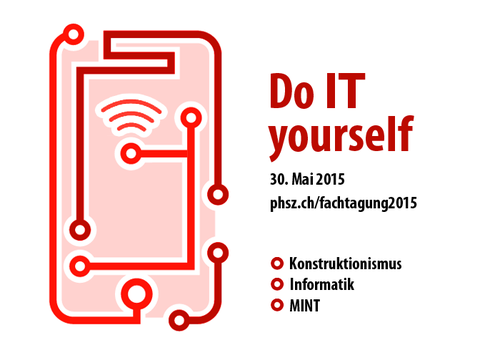
Jonglieren mit digitaler Bildung
02 June 2015 - Version 1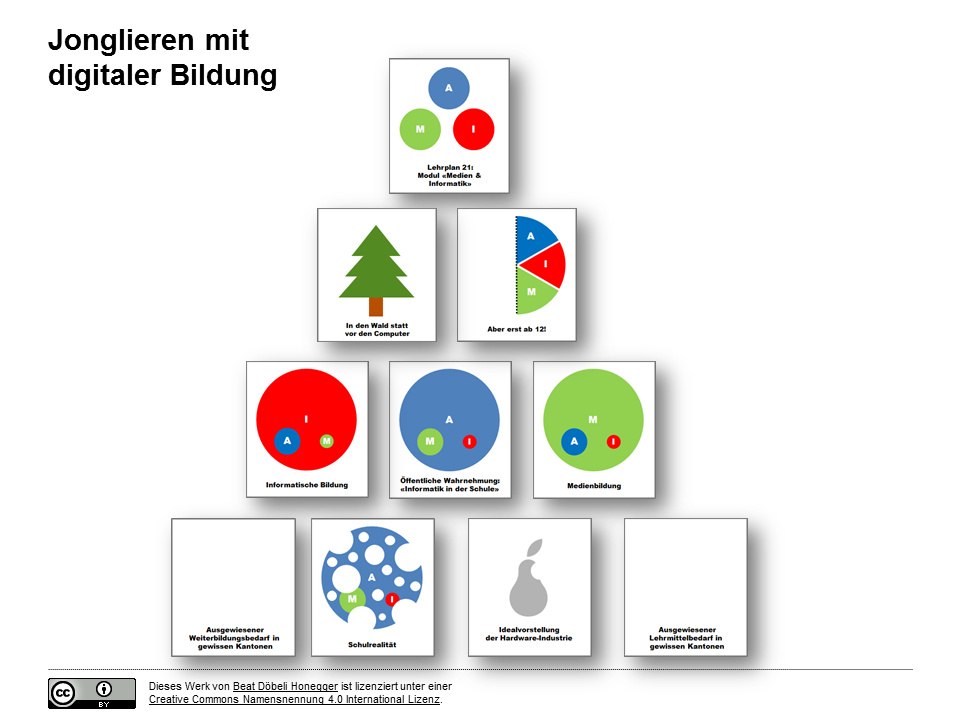
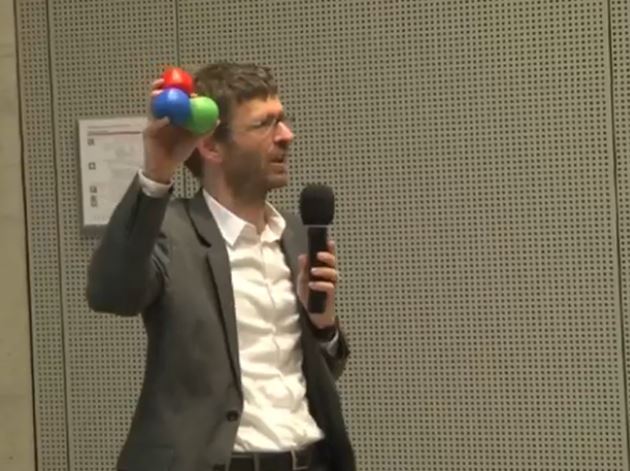
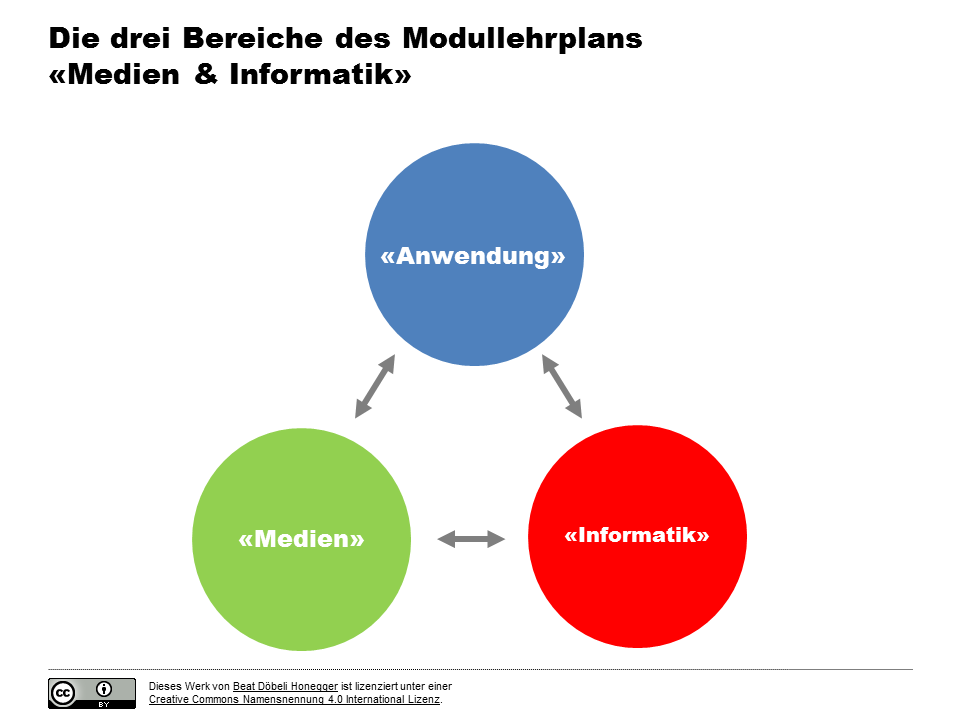
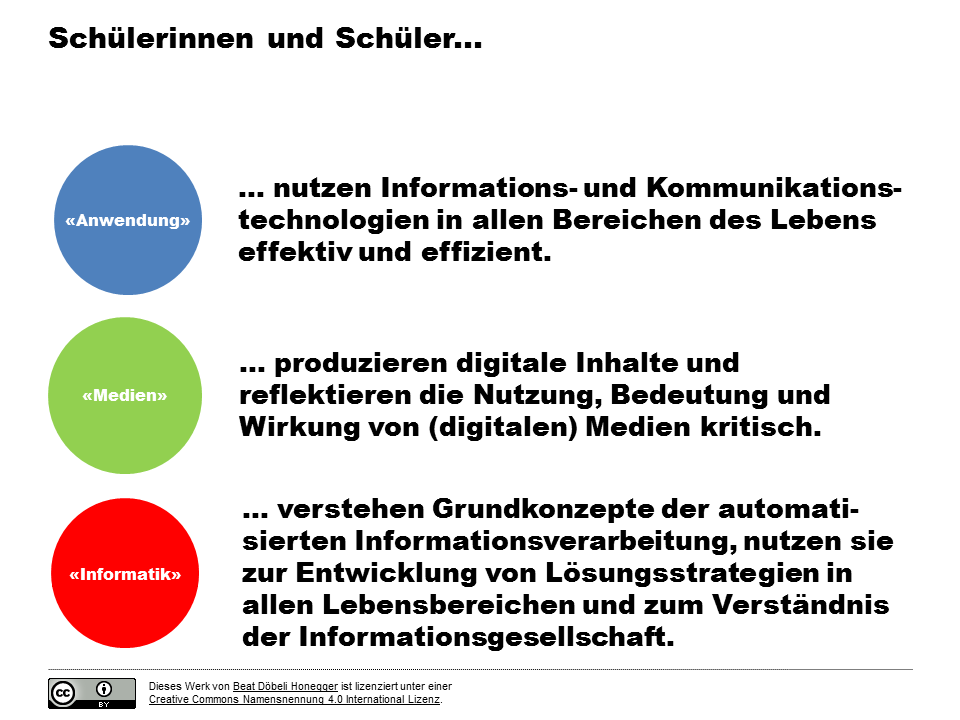
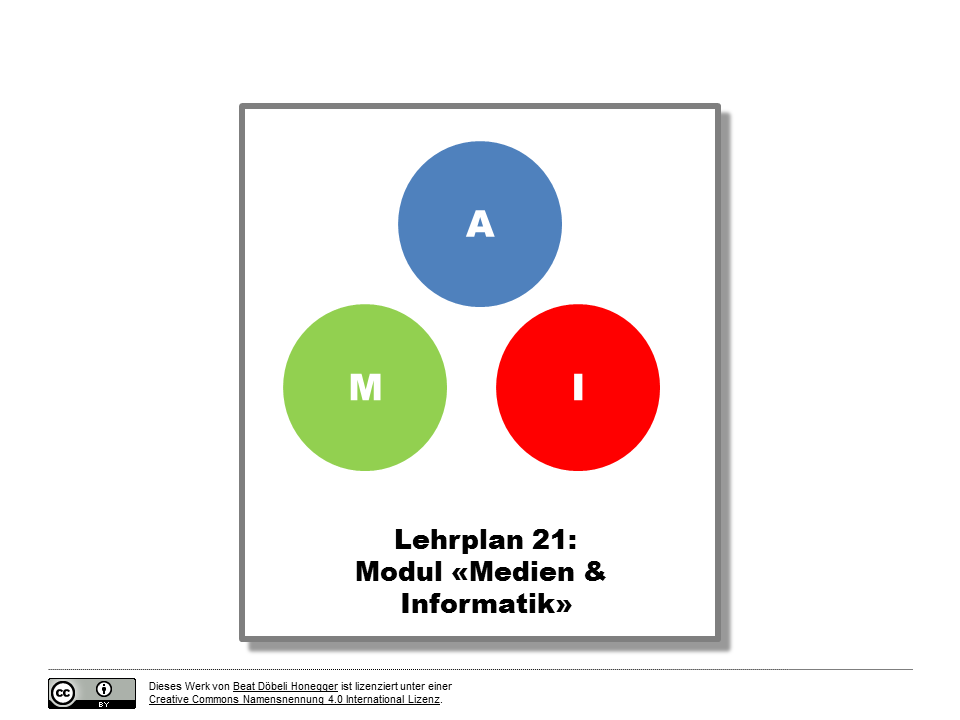
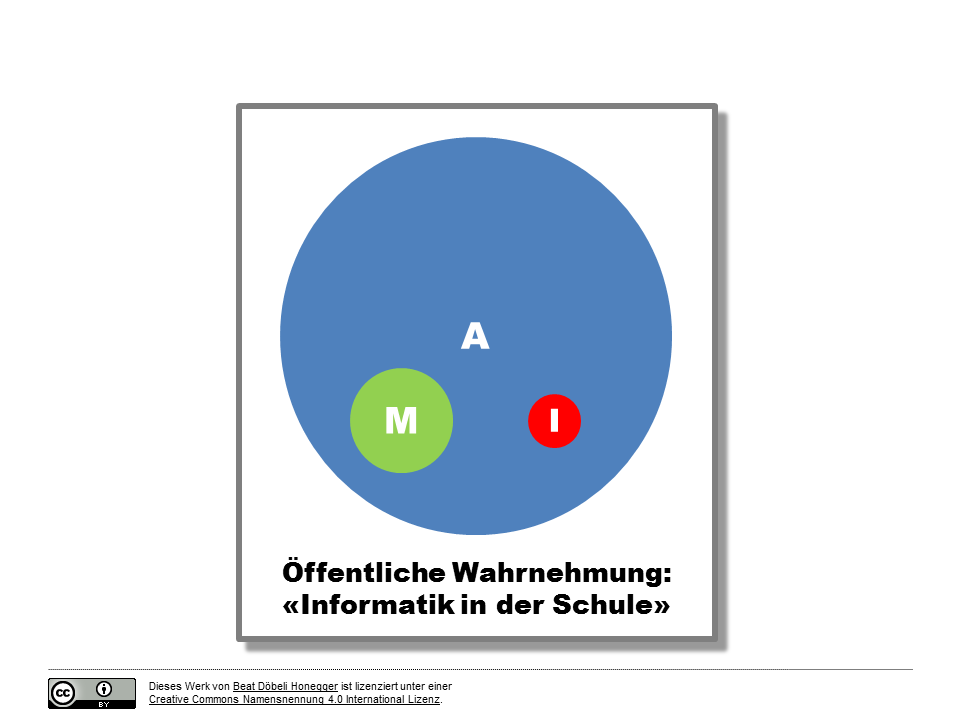
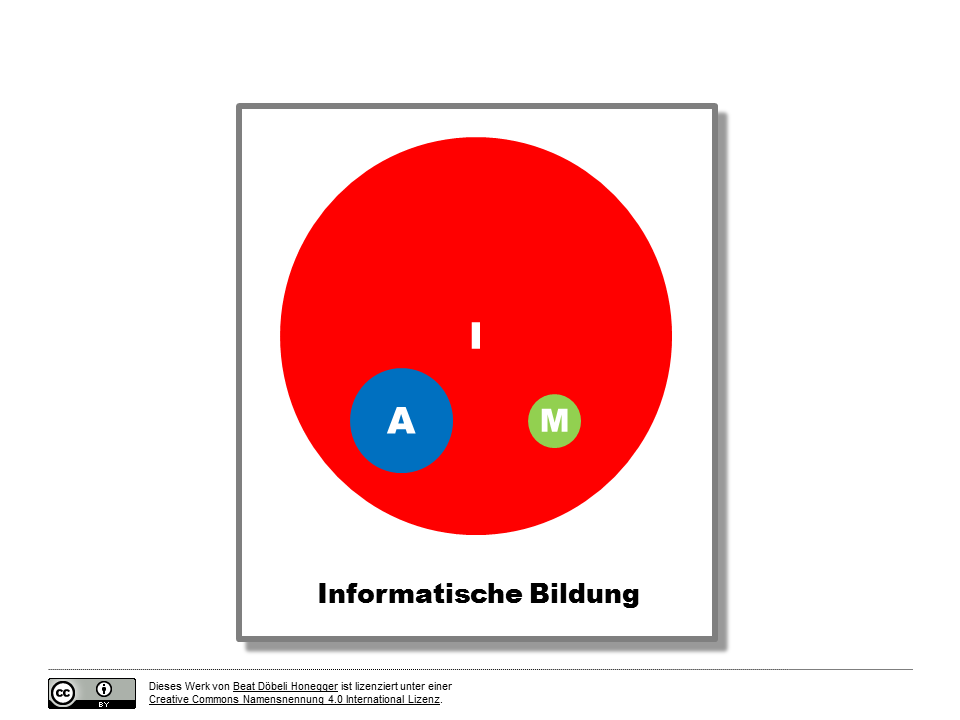
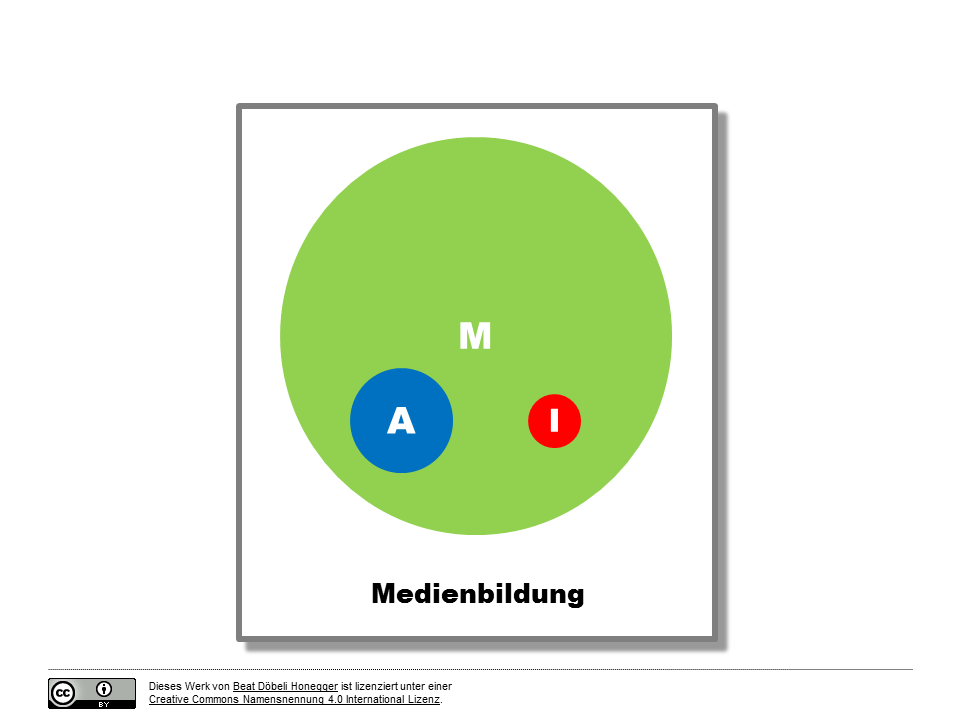
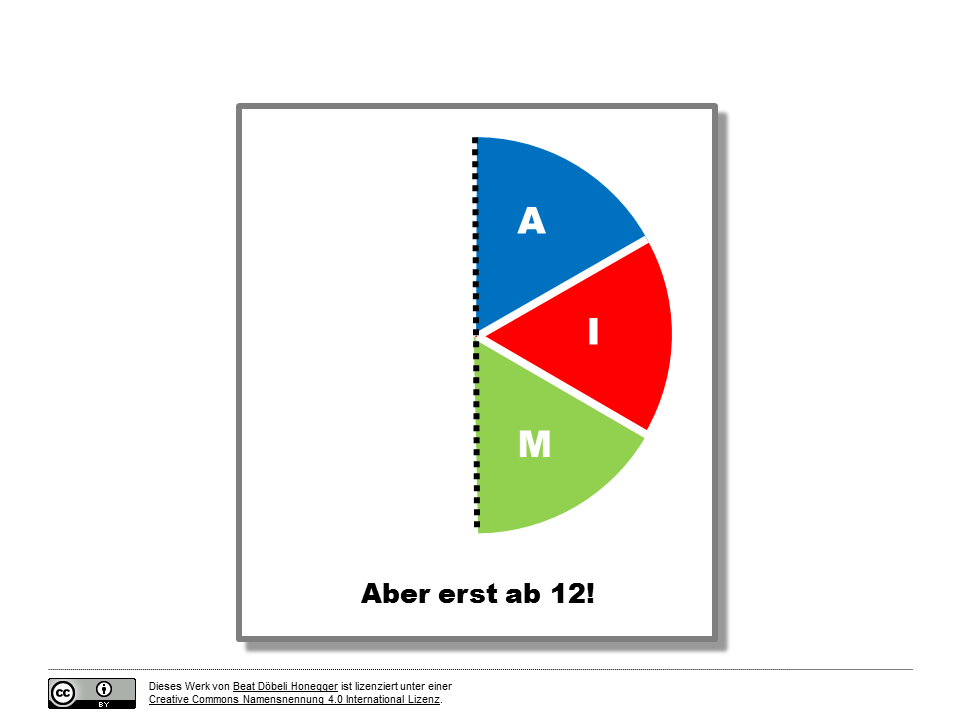
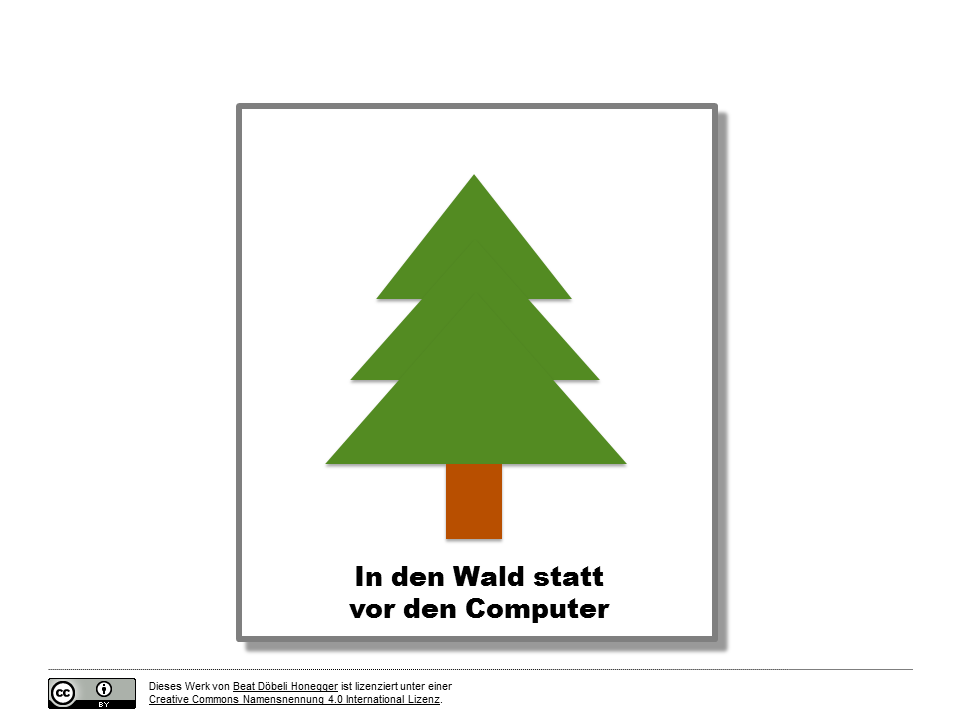
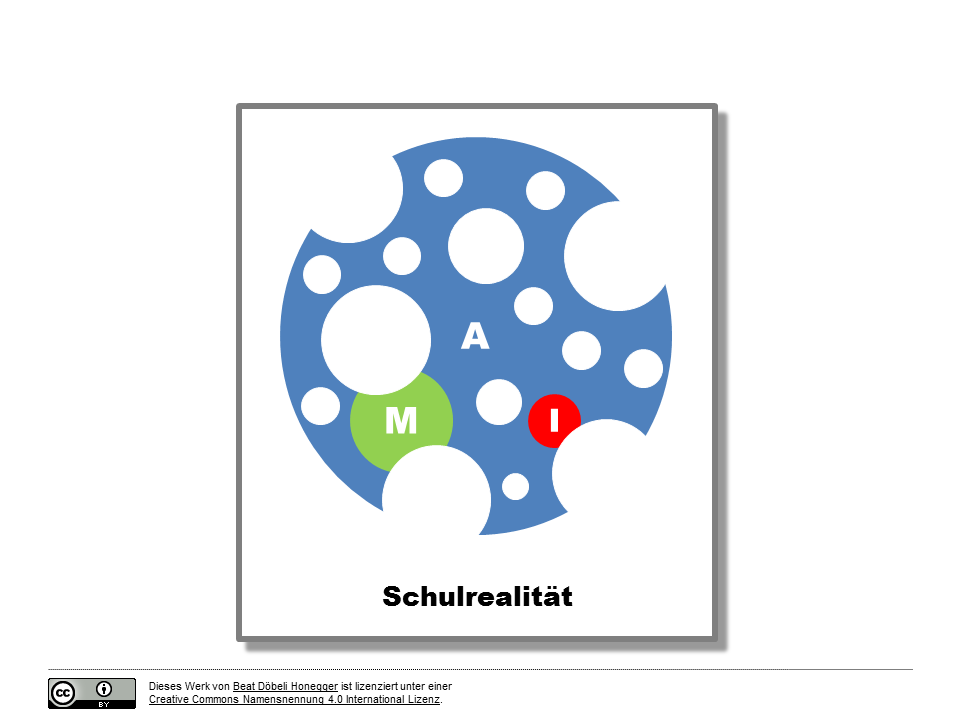
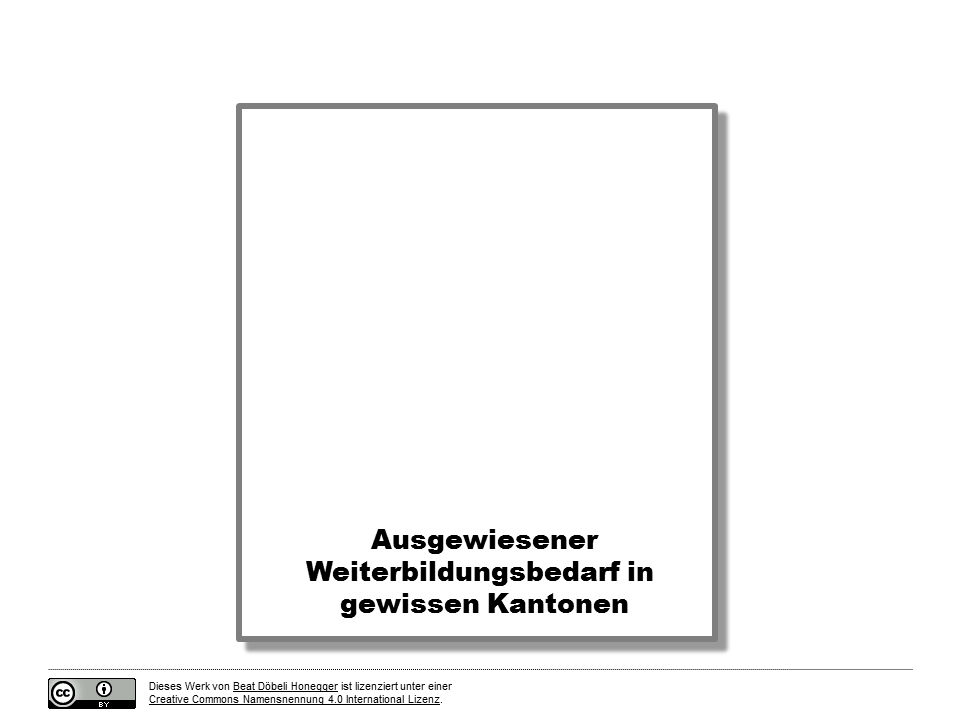
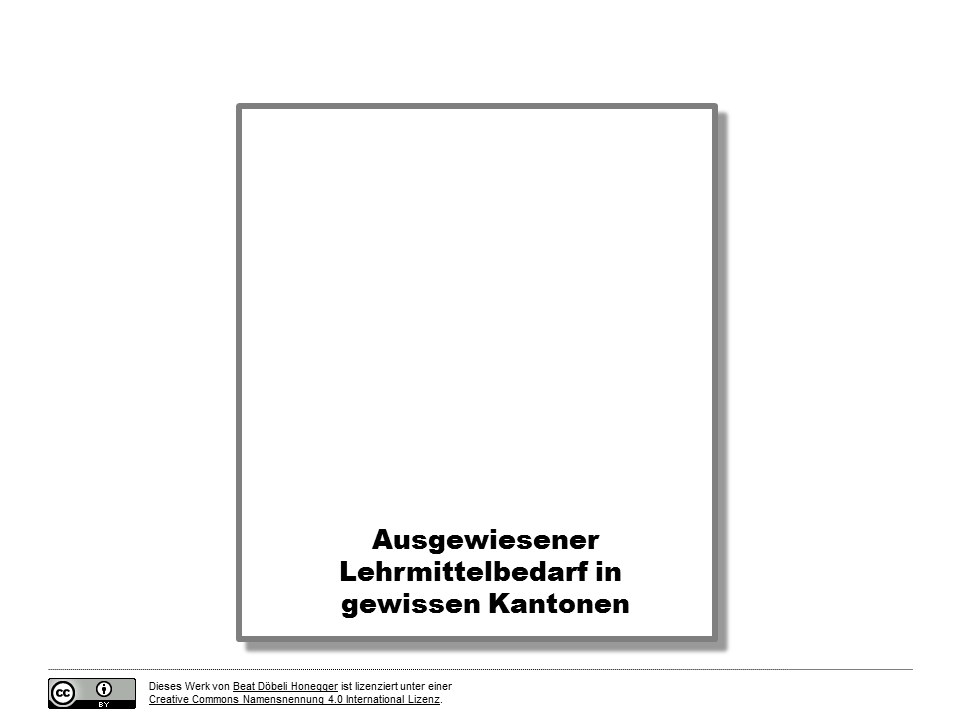
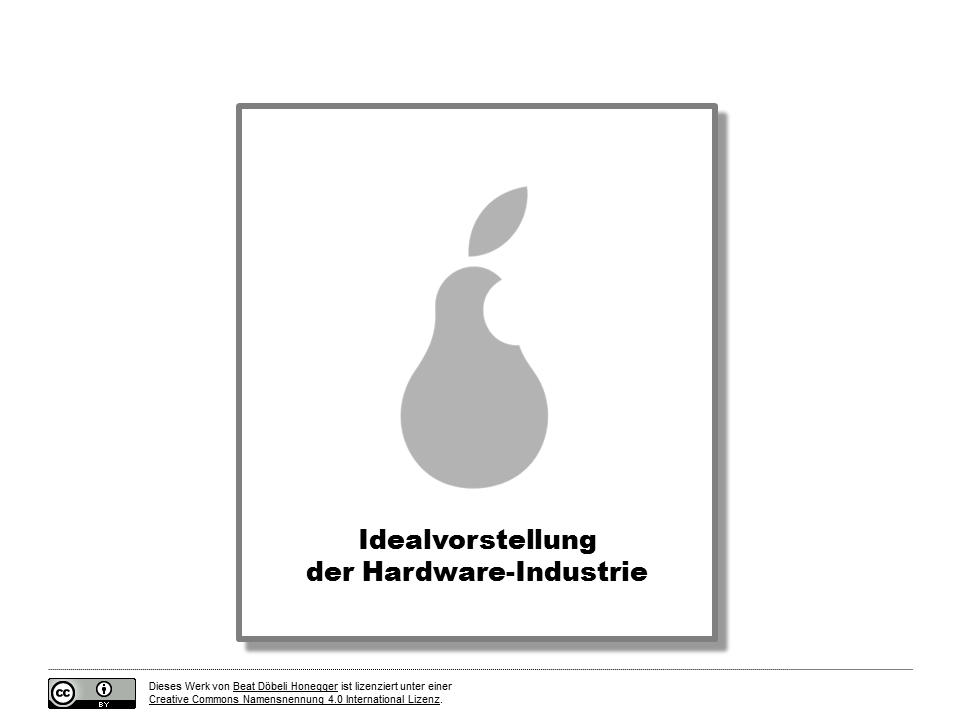
 zur freien Verfügung.
zur freien Verfügung.

Dieses Werk von Beat Döbeli Honegger ist lizenziert unter einer Creative Commons Namensnennung 4.0 International Lizenz. Zum Kommentieren ist eine Registration notwendig.
Symbolisches Bilder-Löschen in der Informationsgesellschaft
26 May 2015 - Version 1 Es ist ja nett diese Geschichte. Da macht ein junger Mensch in Bern ein Selfie mit dem französischen Staatspräsidenten und zeigt dazu den Stinkefinger. Natürlich geht das diplomatisch gar nicht. Also entschuldigt sich der junge Mann und löscht das Bild. Und die Medien berichten darüber: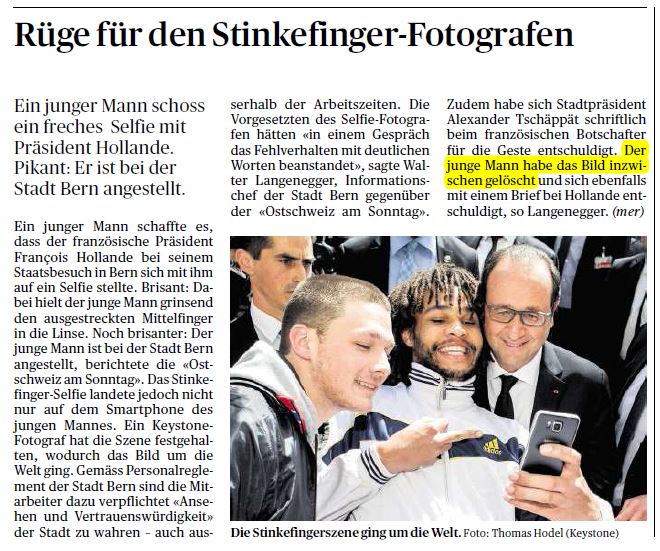
i-factory ein Erfolg: Verlängert bis 2020
12 May 2015 - Version 1 Die Informatik-Ausstellung i-factory im Verkehrshaus der Schweiz in Luzern und insbesondere das Angebot für Schulen ist ein Erfolg. Seit der Eröffnung Ende 2010 konnten laut Angaben der Hasler Stiftung über 800 Lehrpersonen geschult werden, die ihrerseits mit über 20'000 Schülerinnen und Schülern von der Hasler Stiftung finanziert die Ausstellung besucht haben.
Die i-factory kann von Schulklassen reserviert werden. Lehrpersonen, welche den teachers workshop besucht haben, profitieren vom i-factory school kit als Gratispaket. Der reservierte Schulbesuch (Anreise mit dem ÖV, Museumseintritt sowie Reservationskosten) wird von der Hasler Stiftung offeriert.
Mehr Infos ...
Zum Kommentieren ist eine Registration notwendig.
< Previous Page 26 of 333 Next >
Kontakt
- Beat Döbeli Honegger
- Plattenstrasse 80
- CH-8032 Zürich
- E-mail: beat@doebe.li
